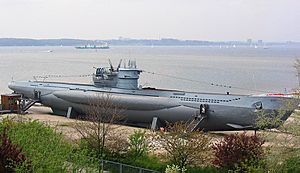German submarine U-930 facts for kids
class="infobox " style="float: right; clear: right; width: 315px; border-spacing: 2px; text-align: left; font-size: 90%;"
| colspan="2" style="text-align: center; font-size: 90%; line-height: 1.5em;" | 
|} The German submarine U-930was a type of U-boat(which is a German submarine) used by Nazi Germany's navy, the Kriegsmarine, during World War II. It was a Type VIIC/41 submarine, a common and powerful kind of U-boat. The order to build U-930was placed on April 2, 1942. Its construction began on April 20, 1943, at the Neptun Werft shipyard in Rostock. The submarine was officially put into service on December 6, 1944, with Oberleutnant zur SeeKurt Mohr as its commander.
Contents
| History | |
|---|---|
| Name | U-930 |
| Ordered | 2 April 1942 |
| Builder | Neptun Werft AG, Rostock |
| Yard number | 517 |
| Laid down | 20 April 1943 |
| Commissioned | 6 December 1944 |
| Fate |
|
| General characteristics | |
| Type | Type VIIC/41 submarine |
| Displacement |
|
| Length |
|
| Beam |
|
| Height | 9.60 m (31 ft 6 in) |
| Draught | 4.74 m (15 ft 7 in) |
| Installed power |
|
| Propulsion |
|
| Speed |
|
| Range | |
| Test depth |
|
| Complement | 44-52 officers & ratings |
| Armament |
|
| Service record | |
| Part of: |
|
| Commanders: |
|
| Operations: | None |
| Victories: | None |
Submarine Design and Features
U-930 was a Type VIIC/41 submarine. This type was an improved version of the earlier Type VIIC submarines.
Size and Weight
When U-930 was on the surface, it weighed about 769 tonnes (757 long tons). When it was underwater, it weighed more, around 871 tonnes (857 long tons). The submarine was 67.10 m (220 ft 2 in) long overall. Its main body, called the pressure hull, which protects the crew from the high pressure of the deep sea, was 50.50 m (165 ft 8 in) long.
The submarine was 6.20 m (20 ft 4 in) wide and 9.60 m (31 ft 6 in) tall. It sat 4.74 m (15 ft 7 in) deep in the water.
Engines and Speed
U-930 used two powerful diesel engines when it was on the surface. These engines gave it a top speed of 17.7 knots (32.8 km/h; 20.4 mph) (knots). When submerged, it switched to two electric motors, which allowed it to travel at 7.6 knots (14.1 km/h; 8.7 mph).
The submarine could travel a long way without needing to refuel. On the surface, it could go about 8,500 nautical miles (15,700 km; 9,800 mi) (nautical miles) at a speed of 10 knots (19 km/h; 12 mph). Underwater, it had a shorter range, about 80 nautical miles (150 km; 92 mi) at 4 knots (7.4 km/h; 4.6 mph).
Diving Depth and Crew
U-930 was designed to operate at depths of up to 230 metres (750 ft) (about 755 feet). Its strongest part, the pressure hull, could withstand pressures down to 250–295 m (820–968 ft) before it might start to crush.
The submarine usually had a crew of between 44 and 52 sailors and officers.
Weapons and Armament
U-930 was well-armed for its missions. It had five torpedo tubes, which are tubes used to launch torpedoes. Four of these tubes were at the front (bow) of the submarine, and one was at the back (stern). It carried a total of 14 torpedoes.
For fighting on the surface or against aircraft, it also had several guns:
- One 8.8 cm (3.46 in) deck gun with 220 rounds of ammunition.
- One 3.7 cm (1.5 in) Flak M42 anti-aircraft gun.
- Two 2 cm (0.79 in) C/30 anti-aircraft guns.
Service History and Final Fate
U-930 did not take part in any major war patrols or battles during World War II. It was commissioned late in the war.
Surrender and Operation Deadlight
The submarine surrendered to the Allied forces at Bergen, Norway, on May 9, 1945, shortly after the war in Europe ended.
After its surrender, U-930 was moved to Lisahally on May 30, 1945. It waited there for nearly seven months. U-930 was one of 116 German U-boats chosen to be sunk as part of Operation Deadlight. This operation aimed to prevent Germany from ever using these submarines again.
On December 29, 1945, U-930 was towed to a specific location in the Atlantic Ocean (55°20′N 07°35′W / 55.333°N 7.583°W). There, it was sunk by the British destroyer Onslow.
See also
 | Madam C. J. Walker |
 | Janet Emerson Bashen |
 | Annie Turnbo Malone |
 | Maggie L. Walker |

